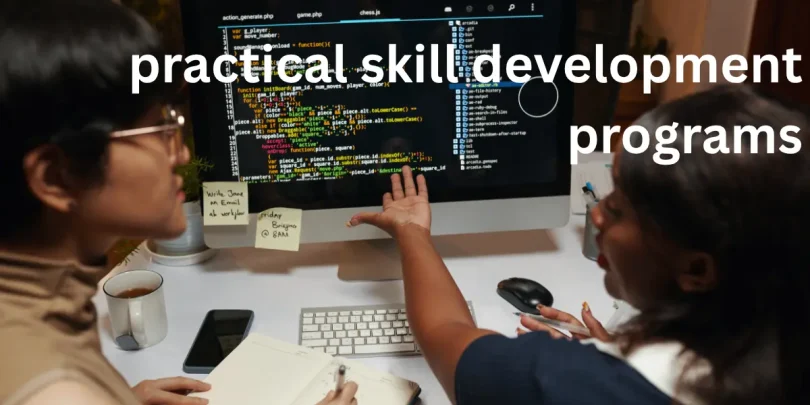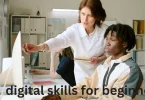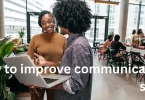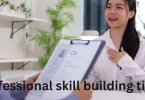Let’s be honest—most of us have been there. You finish school or college, filled with knowledge but unsure how to actually do things in the real world. Maybe you aced your exams, but when it comes to landing a job or starting something on your own, you feel stuck. That’s where practical skill development programs step in. They’re not just about learning—they’re about doing. If you’ve ever wished learning could feel more useful, real, and confidence-boosting, this guide is your new best friend because we’re going to talk about what these programs are, why they matter, and how they can change your life for the better.
What Are Practical Skill Development Programs?
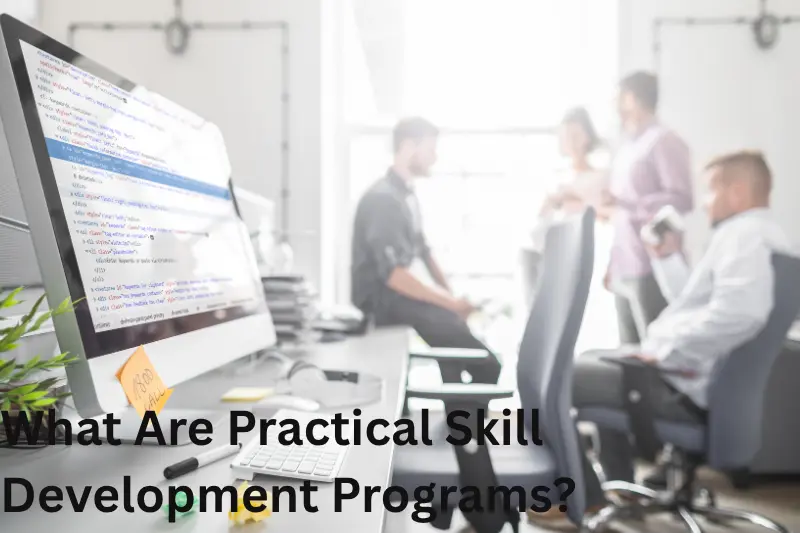
Let’s start simple. Practical skill development programs are training courses that focus on hands-on, real-world learning. Instead of memorizing theories, you get to practice what you learn. Whether it’s communication, coding, graphic design, marketing, or even carpentry—these programs teach you how to apply skills in real life. Think of it as learning to swim by actually getting into the water instead of reading a book about swimming. You’re building confidence by doing the thing, not just studying it. These programs can be online or offline, short-term or long-term, depending on what you want to achieve. The main goal is to prepare you for the real challenges of work and life. They help you bridge the gap between theory and practice and make you ready to face the world with useful, applicable knowledge.
Why Practical Skills Matter More Than Ever
Here’s the deal—employers today aren’t just looking for degrees. They want people who can get things done. You can have a fantastic resume, but if you can’t apply what you know, it’s hard to stand out. Practical skills make you more confident in solving real-world problems, more employable because you can perform tasks, not just explain them, and more independent because you can start projects, freelance, or even build your own brand. In short, practical skills bridge the gap between learning and doing. And that’s where true growth happens. In today’s fast-paced world, knowledge is everywhere, but what sets successful people apart is their ability to act, create, and execute ideas with confidence. Employers love people who can take initiative, think critically, and deliver results—and that’s exactly what practical learning teaches you.
Real Talk: Why Many People Feel Unprepared
Let’s be real. Many of us grew up in an education system that focused more on theory than application. You might know the definition of “critical thinking,” but when it comes to using it in daily decisions, things get tricky. That’s not your fault—it’s just how traditional learning works. The good news? It’s never too late to fix that. With the right program, you can rebuild your confidence, learn step-by-step, and finally feel capable in real-life situations. You don’t have to be an expert or have fancy qualifications to start. What you need is the willingness to learn and the patience to practice. Once you experience that hands-on learning environment, everything changes—you stop memorizing and start understanding.
What You Can Learn from Practical Skill Development Programs
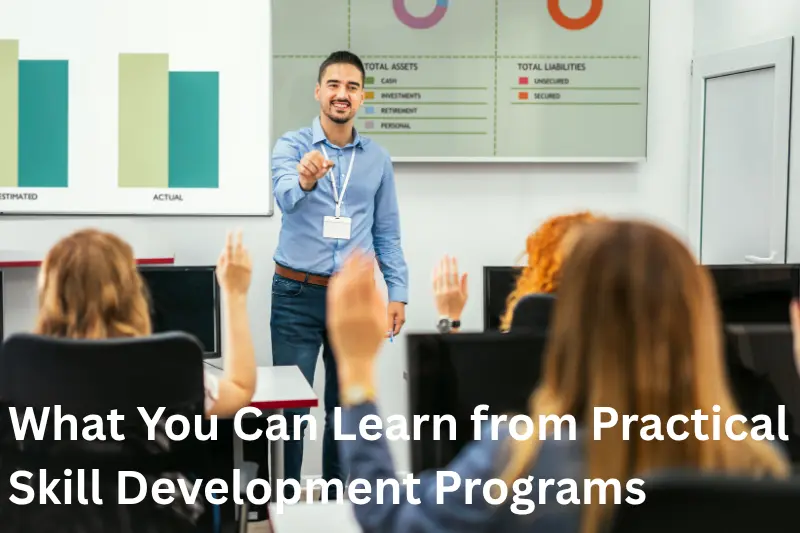
These programs open doors to so many learning opportunities depending on what you’re passionate about.
Technical and Digital Skills
If you’re looking to build a career online or in tech, practical programs can help you learn web development, graphic design, video editing, data analysis, or digital marketing. You don’t need to be a tech genius to start. Many programs begin with the basics and guide you through hands-on exercises so you actually understand how everything works. You’ll learn by creating websites, editing videos, analyzing data, or running social media campaigns—real tasks that give you confidence and build your portfolio.
You may also like to read these articles
Unlock the Best Study Resources for School Students Today
Free Educational PDF Downloads for Smarter Learning and Study Success
Master Success with Study Guides for Competitive Exams
Online Notes and Tutorials 2025: Unlock Smarter Learning Anytime, Anywhere
Empower Your Learning with the Best Websites for Study Resources
Communication and Soft Skills
In almost every job, communication is key. You’ll learn how to present ideas clearly, handle conflicts, and work well with teams. Soft skill development programs help you improve in areas like public speaking, writing and email etiquette, teamwork, leadership, and problem-solving. These are the skills that make you a valuable member of any workplace. Employers often say that technical ability gets you the job, but soft skills help you keep it. Learning how to express yourself clearly, listen actively, and think critically is a huge advantage.
Business and Entrepreneurship
If you dream of starting your own thing, you can find practical programs on business planning, financial management, branding, marketing, customer service, and sales. Instead of vague advice, these programs give you real strategies to put into action right away. You learn how to identify market gaps, create a brand story, price your product, and connect with your audience. These lessons are practical, not theoretical, and can save you years of trial and error.
How to Choose the Right Program for You
Real talk—you don’t want to waste time or money on a random course. So how do you find a program that’s actually worth it? Start by knowing your goals. Ask yourself: What do I want to achieve? Do you want a promotion? A new job? To start freelancing? Your goal determines the kind of program you should choose. Check the course structure—good programs include projects, case studies, and peer feedback. Avoid ones that are just video lectures without any practical assignments. Look for reviews and outcomes. What are past learners saying? Did the program help them get jobs or build confidence? Real experiences are a good sign. Also, consider the duration and cost. You don’t have to choose the longest or most expensive one—sometimes the shorter, more focused courses make the biggest difference.
Online vs. Offline Programs: Which Is Better?
Both have their pros and cons. Online programs are perfect if you need flexibility. You can learn from home, at your own pace, and revisit lessons anytime. They’re great for people balancing work, family, or studies. Offline programs are better if you thrive on in-person interactions. You get immediate feedback, network with peers, and enjoy that classroom energy. If possible, try a hybrid model—it combines online convenience with face-to-face learning benefits. The best part is that both formats are widely available now, so you can pick what suits your lifestyle and comfort level.
Common Struggles Beginners Face (and How to Overcome Them)
Starting something new can feel scary. Many people feel intimidated, especially when they see others who seem more experienced. But here’s a secret—everyone starts from zero. Focus on progress, not perfection. Each small step matters. If time is your challenge, create a mini routine. Even 30 minutes a day can change your pace. Fear of failing is another big barrier. Remember, mistakes are part of the learning process. Practical programs are designed to let you experiment and grow. The goal isn’t to be flawless—it’s to improve with every attempt. You’ll build confidence naturally as you apply what you learn and see results.
The Real-World Benefits You’ll Notice
Once you start applying what you learn, the transformation is incredible. You’ll feel more confident handling new challenges, communicating with others, and solving problems efficiently. You’ll start to see opportunities where you once saw obstacles. Employers will notice your ability to take initiative and get results. You’ll also be able to work independently, which opens doors to freelancing or side projects. Perhaps the most rewarding part is that you’ll start believing in yourself. You’ll realize you’re capable of learning anything as long as you put in the effort.
How Practical Learning Builds Lifelong Confidence
Confidence doesn’t come from memorizing—it comes from practice. When you’ve done something enough times, you stop doubting yourself. You know how to handle unexpected challenges because you’ve been through similar situations during your training. Practical skill development builds resilience. It teaches you that even when things go wrong, you can find solutions. This mindset goes beyond work—it shapes your entire life. Once you gain this kind of confidence, you stop waiting for opportunities and start creating them.
Future-Proofing Your Career
The world is changing faster than ever. New technologies, automation, and AI are reshaping jobs daily. But practical learners stay ahead because they know how to adapt. When you understand how to apply new knowledge, you’re never left behind. These programs encourage lifelong learning, so you stay relevant no matter what field you’re in. If you keep upgrading your skills, you’ll always have options. You’ll feel secure knowing you can pivot, evolve, and thrive in any situation.
How to Start Your Skill Development Journey
Here’s the truth—starting is the hardest part. But once you begin, it gets easier. Identify the skills you need. Research programs that match your goals. Choose one with real-world projects, not just theory. Set a schedule you can actually follow and stick to it. Practice daily, even if it’s just for a short time. Reflect on your progress regularly. The more consistent you are, the faster you’ll grow. Remember, it’s not about being perfect. It’s about showing up and putting in the effort every day.
Common Myths About Practical Skill Development
There are so many misconceptions that stop people from taking action. One common myth is “It’s too late to learn new skills.” That’s false—learning never stops. People of all ages are learning new trades, switching careers, and succeeding. Another myth is “Only tech skills matter.” While digital skills are in demand, soft skills like communication, creativity, and adaptability are equally valuable. A third myth is “You need expensive programs.” Not true at all. Many affordable and even free resources can help you build real-world skills if you stay consistent.
Small Steps That Make a Big Difference
If you’re unsure where to begin, start small. Pick one skill that genuinely interests you. Maybe it’s learning Excel, improving your writing, or understanding social media marketing. Focus on mastering one thing at a time. Over time, those small steps compound into major growth. You’ll start noticing how much more confident, productive, and resourceful you’ve become. The magic lies in taking consistent action, not giant leaps.
Takeaway Checklist
Before wrapping up, here’s a simple checklist to guide you: identify one area you want to improve, research practical programs, choose one that includes real projects, set a learning goal, and apply what you learn right away. Keep your goals realistic. Consistency will take you further than intensity.
Conclusion
At the end of the day, practical skill development programs are about empowerment and self-growth. They help you build the kind of confidence that comes from actually doing things—not just reading about them. Whether you’re a student seeking direction, a professional upgrading skills, or someone looking for a fresh start, these programs can help you move forward. They teach you how to think practically, act decisively, and solve problems confidently. The best time to begin is now. Don’t wait for perfect timing or external motivation. Start small, stay consistent, and watch yourself transform into a capable, confident version of who you’ve always wanted to be. The journey might be slow at first, but every skill you gain will open new doors and make you realize that you can shape your future, one practical step at a time.
FAQs
What are practical skill development programs?
These programs focus on hands-on training that helps you apply knowledge directly to real-life work situations, making learning more useful and engaging.
Why are practical skills important for my career?
Practical skills make you job-ready, improve your problem-solving abilities, and help you stand out in a competitive job market.
Who can join practical skill development programs?
Anyone—students, graduates, job seekers, or professionals—can enroll to improve their skills or switch to a new career field.
How long do practical skill development programs usually take?
It depends on the course type; some last a few weeks, while others may run for several months for advanced mastery.
Can practical skill development programs help me get a job?
Yes, they enhance your employability by giving you hands-on experience and practical expertise that many employers look for.


